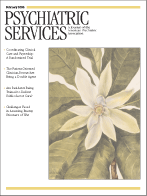Representation of Asylum Seekers and Refugees Among Psychiatric Inpatients in London
Abstract
OBJECTIVE: Refugees are at high risk of mental disorders but often complain about a lack of access to appropriate care. The purpose of this study was to assess the representation of refugees among psychiatric inpatients, given that it has been suggested that they use a disproportionate level of care compared with nonrefugees. METHODS: A census of all psychiatric inpatient units in London was used to determine the numbers of inpatients, the numbers of refugees, and measures of need, such as compulsory detention, duration of admission, need for interpreters, and whether inpatient status was appropriate. RESULTS: Of 2,955 psychiatric inpatients, 134 (4.5 percent) were refugees. Refugees' admission rates were similar to or lower than those of nonrefugees. Refugees were more likely to be inappropriately placed, to require interpreters, and to have more complex needs. CONCLUSION: The results of this study suggest that refugees are not overusing London's psychiatric inpatient units but have complex needs that challenge existing service providers.



